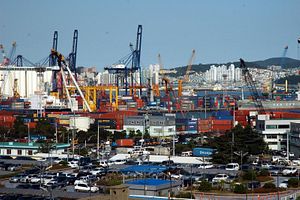This week, Japan’s Ministry of Economy, Trade, and Industry announced new restrictions on exports to South Korea of key materials used in tech manufacturing, a move that ups the ante amidst a period of increased tensions between the two countries.
The core issue is an ongoing debate over South Korean court rulings that have allowed individual Korean citizens to sue Japanese companies for compensation over their use of forced labor during World War II. As far as Japan is concerned, all issues related to wartime conduct were settled in 1965 when the two countries signed agreements establishing diplomatic and economic relations that included some reparations for Japanese actions during the war. However, since then Korean activists have disputed the agreement, saying that it did not sufficiently compensate victims, including comfort women and forced laborers, and did not reflect sincere atonement for the Japanese government’s actions during the war.
Last fall, these groups gained major momentum when South Korea’s Supreme Court officially ruled that the 1965 agreement resolved intergovernmental disputes, but did not bar individuals from suing Japanese companies directly. In two related rulings, the Supreme Court ordered Nippon Steel & Sumitomo Metal Corporation to pay four plaintiffs 100 million won ($88,740) each in compensation, and ordered Mitsubishi Heavy Industries, Ltd. to pay compensation ranging from 80-120 million won to 10 additional plaintiffs. After the two companies repeatedly refused to pay the awarded compensation, local Korean courts approved the seizure of corporate assets held in South Korea in order to fulfill the Supreme Court’s verdict. These rulings have opened the floodgates, much to Japan’s chagrin — according to Japan’s Ministry of Foreign Affairs, there are more than a dozen additional cases pending that could impact more than 70 companies.
Now, Tokyo has announced that the sale of certain products will be subject to government review before being approved for sale to South Korea — a move that experts say will essentially bring trade in these materials to a halt. Japanese newspaper The Yomiuri Shimbun even went so far as to call the policy “a de facto embargo.”
The three main materials in question are polyimides, which are used in the manufacture of smartphone and LED displays, as well as etching gas and resist, both used in the semiconductor industry. According to the Korean International Trade Association, South Korea imports 91.9 percent of its resist, 43.9 percent of its etching gas, and 93.7 percent of its polyimides from Japan, meaning that these trade restrictions could force Korean tech manufacturing firms to make major shifts in their supply chain to keep production running. And things could become even worse soon — pending public discussion on the issue, Japan also announced plans to remove South Korea from its “white list” of countries where items of national security concern can be exported without needing a permit.
While the reliance on Japanese exports of these products makes these new restrictions a cause for concern, industry experts seem optimistic about South Korean companies’ ability to survive on reserves in the short term and then begin to shift supply chains to accommodate the change. Some even expected manufacturers to shift more toward domestic Korean suppliers, which would make Japan’s harsh policies more of a boon for the South Korean economy in the long run.
Thus far, the South Korean government has largely stayed silent on the lawsuit issue, mostly deferring to the court’s decision and vowing to continue diplomatic cooperation with Tokyo. For President Moon Jae-in and his Democratic Party, coming out firmly against the wartime labor settlements would be political suicide. In fact, Moon has sided with victim’s advocacy groups multiple times despite diplomatic threats from Tokyo, even going so far as to dissolve a foundation set up via the highly unpopular 2015 comfort women agreement between Seoul and Tokyo that was meant to finally solve the issue of reparations for victims and their families. But Japanese Prime Minister Shinzo Abe has his own political reality to deal with. Some have pointed out that with a Diet election coming up at the end of July, Abe may be trying to rally his conservative base by taking a hardline stance against South Korea.
For the time being, the South Korean government has announced plans to file World Trade Organization disputes against Japan, claiming the harsh new export policies violate trade rules. Seoul’s preferred resolution to the labor lawsuits is to set up a joint fund where South Korean and Japanese companies can voluntarily contribute money for victims — a proposal Japan has soundly rejected. Given the political restrictions for both sides, it may be that these thorny issues are simply not going to be resolved, at least in the short term.
































